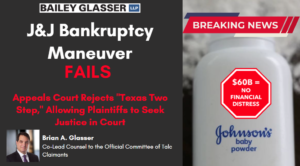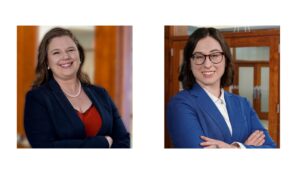
Washington, D.C.: In a huge victory for individuals grievously harmed by Johnson & Johnson baby powder, the Circuit Court of Appeals for the Third Circuit roundly rejected Johnson & Johnson’s attempt to shovel all 38,000 cases into a brand-new subsidiary which then, within hours of creation, declared bankruptcy. In strong language, the federal appeals court found that the JNJ/LTL petition “has no valid bankruptcy purpose” and dismissed the bankruptcy in its entirety, reversing a ruling by a lower bankruptcy court.
The dismissal of the LTL bankruptcy now allows plaintiffs harmed by J&J’s consumer products to continue pursuing justice before a jury trial of their peers, a right afforded them by the United States Constitution.
Brian A. Glasser, founding partner of the national law firm Bailey & Glasser, LLP, was co-lead counsel to the trial team vindicated by the appeals court. Mr. Glasser states today: “J&J has no special right to put talc victims in a bankruptcy box. It now has to face these claims in front of juries around the nation.”
Specifically, Mr. Glasser argued at trial that Johnson & Johnson’s choice of bankruptcy as means to control its liabilities costs was invalid because “LTL was never in financial distress during its brief existence” because the phantom subsidiary was “eminently solvent” as it enjoyed access to more than $60 billion in Johnson & Johnson funds.
The Third Circuit agreed with Mr. Glasser in its opinion, finding that “we cannot agree LTL was in financial distress when it filed its Chapter 11 petition. The value and quality of its assets, which include a roughly $61.5 billion payment against J&J and New Consumer, makes this holding untenable.” Continue Reading
Like this:
Like Loading...



